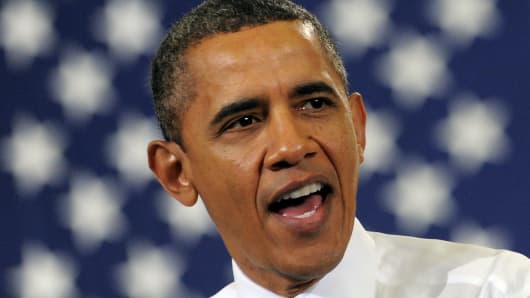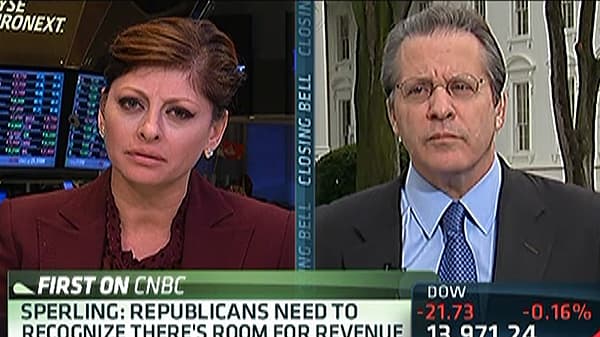As for the president's speech, analysts expect to hear about jobs, climate change, defense, energy, immigration, gun control and the housing recovery. But they all point to the sequester, and they all say the president's positioning on the topic will be important for the market and set the tone for the next couple of weeks as the March 1 deadline nears.
"This could be one of the most interesting State of the Union addresses in years because of the sequestration," said Larry McDonald, Senior Director, U.S. Credit, Equity and Policy Strategist at "You have a March 1 hard core fight right after the State of the Union."
McDonald said the equity market is not yet pricing in the sequester, despite the fact that traders increasing believe the automatic $85 billion in spending cuts might take place this year. If the president "grandstands about the size of government and taxes," opposed by Republicans, the market reception will be poor.
(Watch Now: Obama to Ask For Short-Term Budget)
"If he goes down that road that creates a risk off in the market," said McDonald. The sequester is particularly hard on the defense budget, since it would bear half the cuts," he said. "If the president extends an olive branch, and it's meaningful that's going to be good for the market," he said.
Zane Brown, fixed income strategist with Lord Abbett, said he expects the president to maintain the same tone he had during the Inaugural speech, and the market is not likely to respond well. "Instead of coming across as being more cooperative and less divisive, he'll position his side all over again and people will understand we do have a problem and Congress is not likely to resolve its differences any time soon. The market is just closing its eyes and hoping there will be agreement again. I think that could disappoint stock markets and cause them to anticipate longer and uglier grid lock."
State of the Union addresses are typically not big market movers, and the average stock market move on the day after has been about 0.15 percent, according to LPL Financial chief investment strategist Jeff Kleintop. In a note, he said it is unlikely to be a big market mover and most speeches see less than a 1 percent move in the market on the following day.
The two big themes he will be watching are the fiscal cliff-related comments and comments on energy independence.
"Fiscal cliff-related comments hold potential consequences for defense, consumer discretionary, and high dividend-paying stocks. Comments on energy independence could lead to a bounce in clean energy stocks that soon fades. Talk of the elimination of tax breaks for the exploration and production companies in the energy sector could act as a negative," he wrote.
What Else to Watch
Currency wars top the list for the foreign exchange market. While the equity market was quiet Monday with a 21 point loss in the Dow to 13,971, foreign exchange traders were watching a late day zinger for the yen. The dollar rose to 94.34 after Treasury Undersecretary Lael Brainard said the U.S. supports Japan's efforts to end deflation and reinvigorate growth, but she also said the G-20 must avoid currency devaluations.
Japanese officials have talked down the yen but it's clear that G-7 partners are not thrilled with the efforts. "I think we'll see more verbal protest from the U.S. and maybe Europe as we get closer to Friday's G-20 meeting in Moscow," said Gilmore. "For the time being we have a new high in dollar/yen."
(Read More:
Where Other Asian Countries See the Yen
)
Gilmore said Brainard was in fact making an unusual protest of Japan's effort to knock the yen lower. "It sets a bad precedent for other countries. You have half the world talking about a currency war, and if a leading member of G-7 is actually talking down its currency, it's hard to address anyone in the world who is devaluing."
There are a few major earnings reports Tuesday, including Barclays, Coca-Cola, McGraw-Hill, Michael Kors, Fidelity National, Avon Products, Marsh and McLennan, Fossil and Goodyear, before the bell. After the bell earnings are expected from Western Union, Cliffs Natural Resources, FMC, Bankrate, Netgear and Buffalo Wild Wings. The NFIB small business survey is released at 7:30 a.m. ET and jobs opening data is released at 10 a.m. The Treasury auctions $32 billion in 3-year notes at 1 p.m.
There are Fed speakers Tuesday, including Kansas City President Esther George at 11:30 a.m. and Philadelphia Fed President Charles Plosser at 8 p.m.
Other speakers at the Goldman Sachs conference include eBay CEO John Donahoe at 11:10 a.m. and Yahoo CEO Marissa Mayer at 3:30 p.m.





